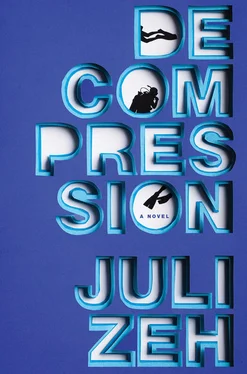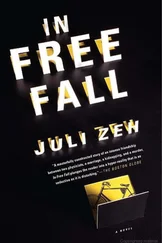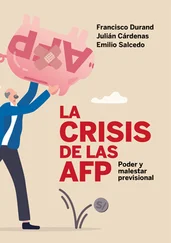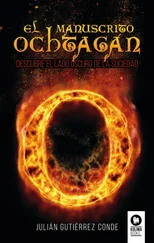We didn’t get that far. We were barely twelve meters down when I spotted it where it lay, buried in sand. It was over a meter long, surely a male. Electric rays always reminded me of the snowmen my mother baked out of cookie dough for Christmas. Two circular discs, one large and one small, joined together in a single flat object. Also known as torpedo fish, electric rays could generate life-threatening electric shocks.
Laura liked to tell the story about the time she was letting the current carry her backward so that she could keep an eye on her dive group. As she drifted, she disturbed a torpedo with her fins. The creature shot up from the ocean floor, did a full somersault in front of Laura’s nose, and struck her on the elbow. Two hundred volts, underwater. Not necessarily enough to kill you as long as you remained conscious. Laura compared the feeling to being punched hard in the solar plexus. Supposedly, she could still remember what went through her head at the time. She thought she absolutely mustn’t pass out, because the beginning divers wouldn’t be capable of saving her. She thought if the panicked fish zapped one of her clients, she could toss her diving instructor’s license into the trash can. And she thought it was a good sign that she was still able to have such thoughts. She made it to the surface with her group. I took over Laura’s clients for two weeks, until she felt able to get back in the water.
I raised my hand and signaled to Jola and Theo that they should kneel on the bottom. Then I pointed to the torpedo fish and drew the fingers of my other hand in a slashing movement across my throat. Both Jola and Theo nodded. They’d understood what my gesture meant: deadly .
I had them come a little closer. One meter was the approved distance. Electric rays were basically nonaggressive. If they felt they were being attacked, they’d defend themselves within a predictable radius. There was a trick I’d tried a few times since Laura’s experience, and it had always worked. I took off one fin, held it with both hands, and beat the water a few strokes, right above the torpedo. The compression wave blew the sand off the fish’s back. Now you could see its snowman shape and its marbling. An extremely pale specimen. I wagged my fin a few more times, touching the ray’s tail, trying to provoke a reaction. I wanted it to perform a somersault. Jola and Theo were seeing an electric ray for the first time. It could provide their overdue sensation, something they could record in their logbooks. When we were back on dry land, I’d explain to them about the strength of the electric current the torpedo could produce and tell them Laura’s story; maybe I’d even claim it for myself.
But nothing happened. The ray’s body oscillated slackly with the movement of the water. The thing looked like a big cleaning rag. I made a few more efforts, waving my fin as though I were fanning a campfire. Either the fish was in a really deep sleep, or he simply wasn’t going to let himself be disturbed. Finally I gave up and set about putting the fin back on my foot.
What came next is best described in the simplest words: Jola shoved Theo. She picked the right moment. Theo had leaned forward to take a few snapshots of the apathetic torpedo with the underwater camera. He was holding both arms out in front of his body and had shifted his center of gravity well forward. There was scarcely half a meter’s distance between the camera and the skin on the ray’s back. In this position, Theo was knocked completely off balance by Jola’s push. Even though the water resistance slowed his movement, he tipped forward too fast to react properly. Instead of twisting himself to one side, he let go of the camera and stretched out his arms to break his fall on the seafloor. But that was where the torpedo was lying. Theo made some desperate rowing motions in an effort to maintain his distance and avoid touching the fish. I was too far away to reach him with my hands, and so I kicked out at his thigh, hoping to change the direction of his fall. It could have worked. But at that very moment, everything became too much for the torpedo. A tremor went through its still-flaccid body, which stiffened itself into concentrated strength.
No one knows how things look from an electric ray’s viewpoint. Instead of giving Theo a heavy jolt of electric current, the fish decided to flee. With a few powerful lashes of its tail, it propelled itself away from us. Ten meters on, it already felt safe enough from further disturbance to sink back down to the bottom and shovel sand onto its back with the perimeter of its disc-shaped body. On the spot where the torpedo had just been lying, Theo was crouched on all fours. His heavy breathing caused a column of air bubbles to climb up above him. I didn’t even try to hold him back when he arbitrarily broke off the dive and began his controlled ascent.
I had no idea what I was going to do or say once we reached dry land. Instead of structured thoughts, images shot through my head. Of me sitting on a bench up on the quay with Jola and pulling a sea urchin’s spine out of her foot. Of her struggling with Theo in darkness, wind, and rain atop a steep cliff in Famara. All that seemed so astonishingly far back in time that I wondered how long it had actually been since they arrived. However, when I tried to comprehend the immediate here and now, in which the three of us were swimming landward on our backs, I was compelled to the realization that this image too seemed like a memory. As if the present were nothing more than an especially distinct flashback to the past. Even the best plan — a severe tongue-lashing or the irrevocable decision to tell Jola and Theo to go to hell, once and for all — would have done nothing to help me along. Because no one could have prepared himself for what came after we’d clambered up the slippery steps to the quay. No one could have foreseen it. Bent under our heavy tanks and wearing our dripping rubber suits, we’d slipped through the holiday makers on the promenade and finally reached the van. Jola’s entire body was shivering. Not with shame, not with excitement, not even with cold; she was trembling with anger. She set down her scuba tank, threw her fins on the ground, ripped off her diving mask, and immediately went on the attack.
“Are you crazy, doing this ”—she drew her hand across her throat—“when the fish was alive?”
“That,” I said, also making the slashing gesture, “was a deadly fish!”
She stared at me aghast. “So when you stirred up the sand around it, were you doing that so we could see it better, or what?”
“I wanted to wake it up so it would do a somersault for you.”
“That close to us?”
“It wasn’t my first electric ray, Jola.”
“All the same, it was as pallid and limp as a corpse. I thought it was dead!” She repeated my gesture yet again. “Theo could have been killed!”
“Because you shoved him!” I shouted.
“No!” She stood right in front of me, her arms folded, her breasts molded as though in plastic under the tight neoprene. It briefly occurred to me that maybe she wasn’t angry at all, that she simply enjoyed putting on such a performance.
“Because you gave a signal that wasn’t agreed on in advance,” she said. “Haven’t you ever heard that you’re supposed to use only prearranged hand signals? For safety reasons? That’s one of the ‘Do It Right’ principles you value so much, isn’t it?”
Her tone of voice was slowly getting on my nerves. I said, “It’s a gesture everybody understands.”
“No it isn’t, as we see.”
“But you shoved Theo!”
“Don’t try to turn the tables on me. You’re the one who bears the responsibility. You communicated badly, so you alone are to blame. If something had happened to Theo, you’d have had to answer for it.”
Читать дальше












